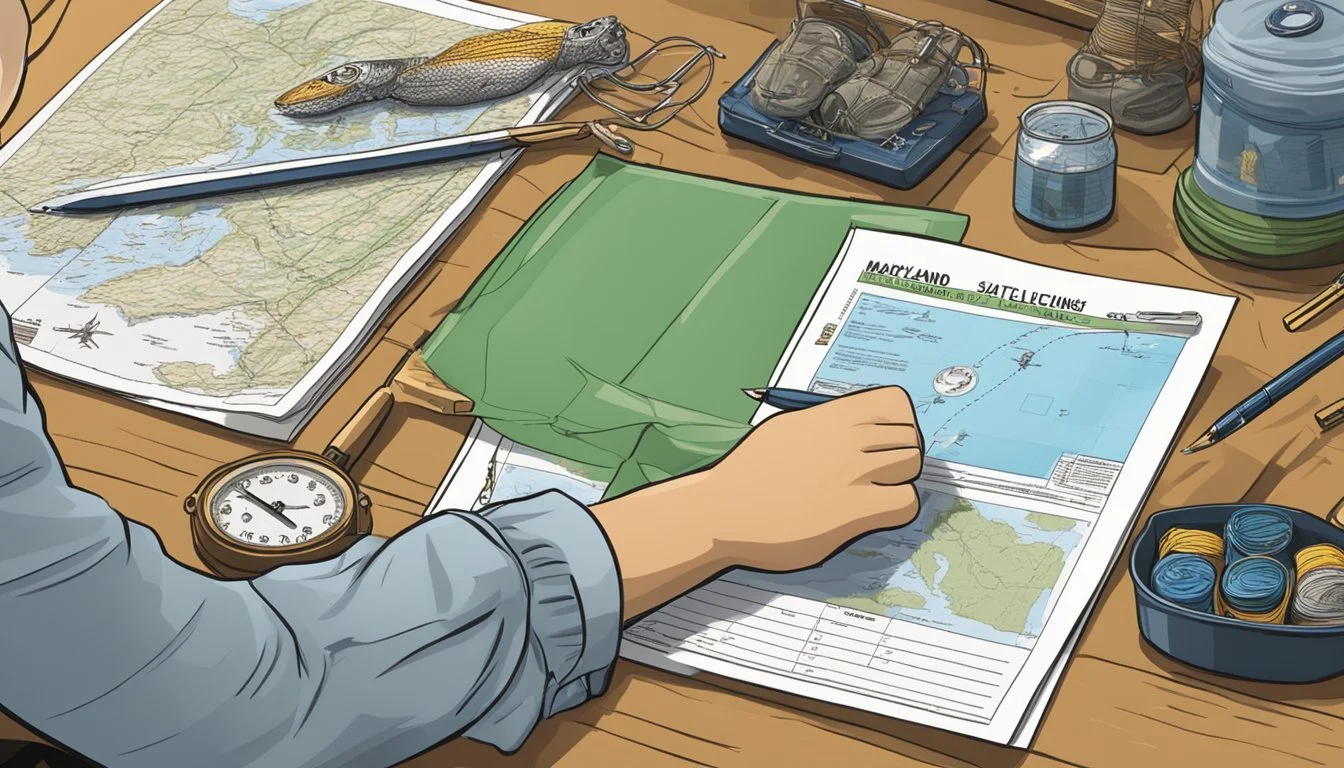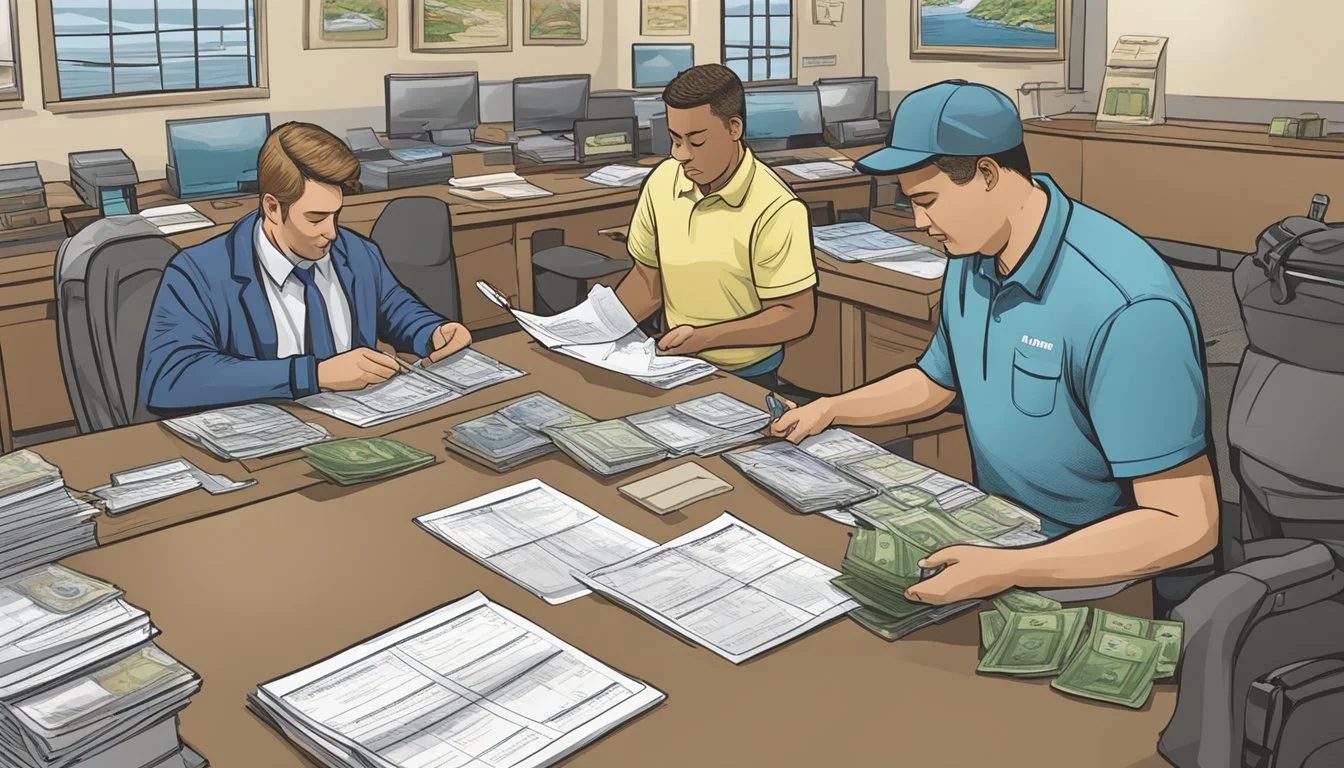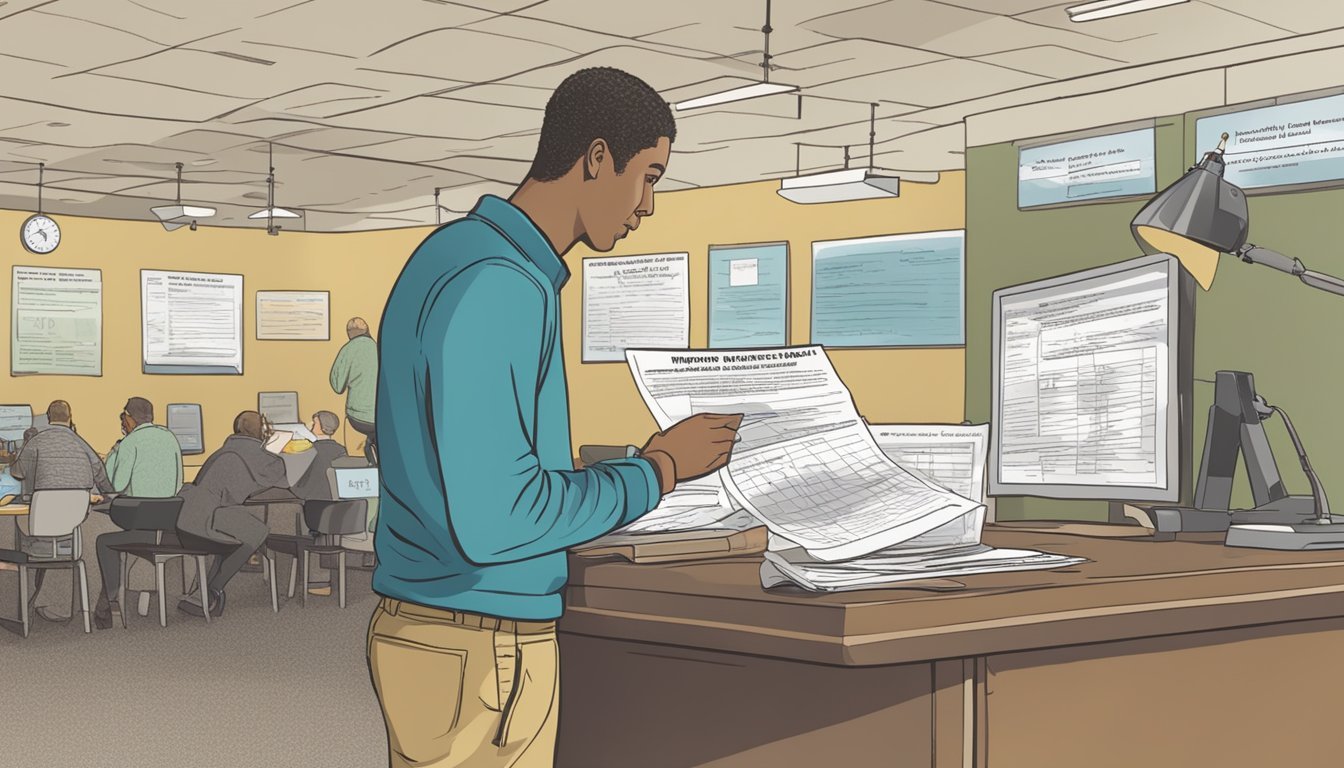How to Get a Maryland Saltwater Fishing License
A Step-by-Step Guide
In Maryland, recreational fishing is a popular activity, drawing both local anglers and visitors to the myriad of saltwater opportunities such as the Chesapeake Bay and the Atlantic Ocean. Regulations require that individuals partaking in this sport must acquire the appropriate fishing licenses or registrations to ensure the conservation of the state's marine resources. The Maryland Department of Natural Resources (DNR) offers various licensing options to accommodate different fishing activities, such as the Bay & Coastal Sport Fishing license, which allows for saltwater fishing throughout the state's tidal waters.
Obtaining a Maryland saltwater fishing license is straightforward. Anglers above the age of 16 who intend to fish (What wine goes well with fish?) in the state's tidal or saltwater areas must have a license. However, there are instances where a free Saltwater Angler Registration will suffice, particularly for anglers who do not fall under the typical licensing requirements. For example, anglers who fish on licensed charter boats, are under the age of 16, or take advantage of the state's free fishing days are exempt from the license but may need the registration.
Maryland has tailored its fishing regulations to facilitate both sport and conservation. It's essential for anglers to understand these regulations, such as seasons, catch limits, and size restrictions, which are in place to sustain fish populations for future generations. Compliance with these regulations not only supports the environment but also ensures that fishermen can continue to enjoy the rich tradition of saltwater fishing that Maryland offers.
Eligibility Requirements for Maryland Saltwater Fishing License
Eligibility for a Maryland saltwater fishing license varies based on several factors such as age, residency status, and specific exemptions for veterans and disabled individuals.
Age Requirements
Individuals under 16: They are not required to obtain a license for recreational fishing or crabbing, using handlines, or dip nets, and can take up to 2 dozen crabs (What wine goes well with crab?) per day without a license.
Individuals 16 and over: They are required to obtain a Maryland saltwater fishing license to fish in Maryland's tidal waters.
Residency Status
Maryland Residents: A resident is someone who has maintained a permanent place of abode in Maryland for more than 6 months.
Non-Residents: Individuals who do not meet the residency requirement must obtain a non-resident license to fish in Maryland waters.
Special Considerations for Veterans, POWs, and Disabled Persons
Veterans and POWs: Service-connected disabled veterans and former prisoners of war may be eligible for reduced fee or complimentary licenses.
Disabled Persons: Residents with service-connected disabilities may also qualify for special licensing privileges. Proof of disability and service connection is typically required.
Types of Saltwater Fishing Licenses
In Maryland, obtaining the correct type of saltwater fishing license is a regulatory requirement to ensure the sustainability of the state's aquatic resources. Whether for recreational or commercial purposes, anglers need to familiarize themselves with the available license options tailored to various fishing activities.
Recreational Fishing License
Maryland provides a Chesapeake Bay & Coastal Sport (Annual) License for individuals who wish to engage in recreational fishing in the designated saltwater areas. Anglers aged 16 or older must obtain this license unless exempted. For those fishing in free fishing areas or on free fishing days, a license may not be necessary.
Commercial Fishing License
Those who fish for profit in Maryland's saltwater must acquire a Commercial Fishing License. This license is specific to individuals or businesses intending to catch and sell marine species and is regulated to monitor and control fishing practices.
Charter and Pleasure Boat Licenses
Operators of charter boats and pleasure craft offering fishing activities are required to hold a valid Charter Boat License. This allows their patrons to fish without individual licenses. A Licensed Charter Boat is one that holds such a license and is commonly used for guided fishing trips.
Complimentary and Special Licenses
Maryland also issues a range of complimentary and special licenses. The Resident Senior Consolidated Sport Fishing License is available for state residents of a certain age, offering a consolidated fishing license at a reduced fee. Additionally, individuals fishing from their own Waterfront Property may be subject to different licensing rules. For those specifically targeting trout, a Trout Stamp is required in addition to the base license.
Registration and Licensing Procedures
Maryland requires both registration and licensing for anglers to legally fish its tidal waters, including the Chesapeake Bay and Potomac River. The registration process is distinct from licensing but plays a crucial role in the state's conservation efforts.
Maryland Saltwater Angler Registration
The Maryland Saltwater Angler Registration is a mandatory free registry for those who fish the Chesapeake Bay and tidal Potomac River but do not need to purchase a Maryland Bay & Coastal Sport Fishing License. Registrants must renew this annually to stay compliant. Anglers can complete this free registration through the COMPASS portal, the Maryland Department of Natural Resources' online licensing and registration system.
License Purchase and Renewal
To legally fish in Maryland's tidal waters, anglers typically must purchase a fishing license. Various types of licenses are available, such as resident, non-resident, or short-term. Anglers can buy or renew their licenses through the COMPASS portal, at a local license agent, or by visiting a Department of Natural Resources Service Center.
License Term:
Annual Licenses: Valid for one year from the date of purchase.
Short-term Licenses: Offered for shorter durations, such as a 3-day or 7-day license for those visiting Maryland or planning brief fishing trips.
Reciprocity and Combinations
Maryland has reciprocity agreements with neighboring states. For instance:
Anglers licensed in Virginia can fish in the tidal waters of the Potomac River up to the demarcation line, under the Potomac River Fisheries Commission regulations.
Conversely, Maryland saltwater fishing license holders can fish the Virginia portions of the tidal Potomac without needing a separate Virginia license.
Similar mutual agreements exist with Pennsylvania and West Virginia for specific waterways.
These agreements allow anglers to fish across state lines in specified areas without purchasing additional licenses, easing the process and encouraging adherence to licensing laws.
Where and How You Can Fish
In Maryland, anglers can enjoy a range of saltwater fishing experiences in designated areas, during free fishing days, and off of privately-owned piers. Understanding the specific locations and regulations will ensure a lawful and enjoyable fishing experience.
Designated Saltwater Areas
Maryland offers numerous designated saltwater areas, including the well-known Chesapeake Bay and various coastal bays. Saltwater anglers can fish these areas provided they have the necessary fishing license. When aboard a licensed charter, a separate license is not required as the charter's license covers all anglers on board.
Free Fishing Areas and Days
There are areas and specific days where fishing is allowed without a license:
Free Fishing Areas: Anglers may fish without a license in designated free fishing spots.
Free Maryland Saltwater Angler Registration: This is required in some cases when fishing for free.
Maryland Free Fishing Days: These are specific days when anyone can fish in Maryland's tidal and nontidal waters without a license.
Property Owners' Privileges
Waterfront property owners in Maryland have certain privileges that allow for fishing without a license:
Those owning property with an attached pier have the right to fish from their pier without a license, under the condition that the body of water is considered tidal.
Valid commercial fishing license holders can obviously fish according to their license permissions.
Remember, regulations can change, and it is the responsibility of the angler to be informed about current laws and requirements.
Crabbing and Additional Saltwater Activities
Maryland offers diverse options for saltwater fishing enthusiasts, which, alongside fin-fishing, include popular activities like crabbing. This section provides detailed information on how to legally engage in these activities, covering topics such as licensing, equipment regulations, and catch limits.
Recreational Crabbing License
Recreational crabbing in Maryland does not require a license if you are using handlines or dip nets. However, if you choose to use traps, you must obtain a Free Registration if operating from waterfront property or have a Recreational Crabbing License if crabbing elsewhere. Registration can be easily completed online via the Maryland Department of Natural Resources website or at one of their service centers.
Gear and Equipment Regulations
For crabbing, Maryland permits the use of handlines, dip nets, and net rings without a license. If you're looking to use traps, they must be collapsible crab traps, also known as turtle-excluder devices. Recreational crabbers are limited to a certain number of traps:
Waterfront property owners: May use up to two crab pots, registered annually.
Non-waterfront crabbing: Requires a Recreational Crabbing License and adherence to the specific gear regulations as per DNR guidelines.
It's important to note that the use of trotlines, while popular, comes with additional rules and regulations that must be followed diligently.
Catch Limits and Seasons
Maryland has established specific catch limits to ensure the sustainability of the crab population:
Daily catch limit without a license: Up to 2 dozen male hard crabs and 1 dozen male soft crabs or peelers.
Season: Crabbing season usually runs from April 1 through December 15, though exact dates can change yearly and should be confirmed with the latest DNR regulations.
Adhering to the seasons and limits is crucial for conservation efforts and to avoid legal penalties. Always check the most current regulations before heading out on your crabbing adventure.
Regulations and Conservation Efforts
Maryland's approach to saltwater fishing regulation ensures the preservation of natural resources while fostering an environment for sustainable fishing practices. The state's policies are designed to balance recreational opportunities with the conservation of marine life and habitats.
Protected Areas and Species
In Maryland, certain areas are designated as protected to conserve local ecosystems and the species within them. Regulations, informed by the Natural Resources Article §4-745 of the Annotated Code of Maryland, delineate where anglers can fish and which species are subject to seasonal and size restrictions. The Chesapeake Bay and tidal Potomac River are notable examples where conservation measures are actively enforced to protect various species such as striped bass and blue crabs.
Enforcement of Regulations
The Maryland Department of Natural Resources (DNR) and the National Oceanic and Atmospheric Administration (NOAA) work together to enforce fishing regulations. Violations are taken seriously to mitigate negative impacts on the natural resources. Anglers must comply with the state's regulations, including obtaining a saltwater license for fishing in tidal waters or a freshwater license for non-tidal/freshwater areas. Those opting for saltwater fishing must also register with the Maryland Saltwater Angler Registration, which is a separate process from NOAA's National Saltwater Angler Registry.
Sustainable Fishing Practices
Maryland prioritizes sustainable fishing practices to ensure the long-term health of its waterways and fish populations. Regulations by the DNR include the use of non-offset circle hooks, which are mandatory when using live bait in the Chesapeake Bay, to minimize the mortality rate of catch-and-release fish. Additionally, there are clear rules governing catch sizes, limits, and seasons to prevent overfishing and to support the recovery of fish stocks. These measures aim to balance the interests of anglers with the state's conservation goals.
Additional Resources and Information
When seeking a Maryland saltwater fishing license, anglers can access a wealth of information and assistance through various programs and updates. Key resources include educational initiatives provided by the Maryland Department of Natural Resources and the latest fishing reports.
Educational Programs
The Maryland Department of Natural Resources offers educational programs aimed at promoting sustainable fishing practices. Interested anglers can explore courses and workshops on different techniques, conservation strategies, and regulations. Further information is available through the department's COMPASS portal, a comprehensive online system designed for license registration and accessing educational resources.
Fishing Reports and Updates
Staying informed about current conditions is crucial for a successful fishing experience. The Saltwater Angler Registry provides regular updates and fishing reports on the state's website. These reports contain valuable information about seasonal changes, species abundance, and other relevant updates that can impact fishing trips. Anglers are encouraged to check these reports before heading out to fish in Maryland's waters.
Frequently Asked Questions
What types of saltwater fishing licenses are available in Maryland?
Resident License
Non-Resident License
Senior License
Military License
Are there any exemptions for anglers under 16 years old? Yes, anglers under 16 do not require a license or free saltwater angler registration.
Do non-residents require a different type of license for saltwater fishing in Maryland? Non-residents must obtain a Non-Resident License unless exempted for specific situations.
What is the Maryland Free Fishing Day? Maryland Free Fishing Days are specific days when no fishing license is required for recreational fishing.
Is there a complimentary license available? Complimentary licenses may be available for qualifying individuals, often subject to certain conditions.
What is a Resident Senior Consolidated License? This is a special license for Maryland residents 65 years or older which consolidates sport fishing and hunting licenses at a reduced fee.
Are separate stamps or registrations required for certain fishing activities?
Resident Trout Stamp
Non-Resident Trout Stamp
Pleasure Boat Decal (for boat owners)
Free Saltwater Angler Registration (for certain exempted anglers)
How does one register for the free saltwater angler registration? Anglers can register online or in person, provided they meet the criteria for exemption from the standard licensing.
Is a separate license required for crabbing in Maryland? Yes, a Recreational Crab License is needed unless exempted by age or participating in Maryland's Free Fishing Days.







